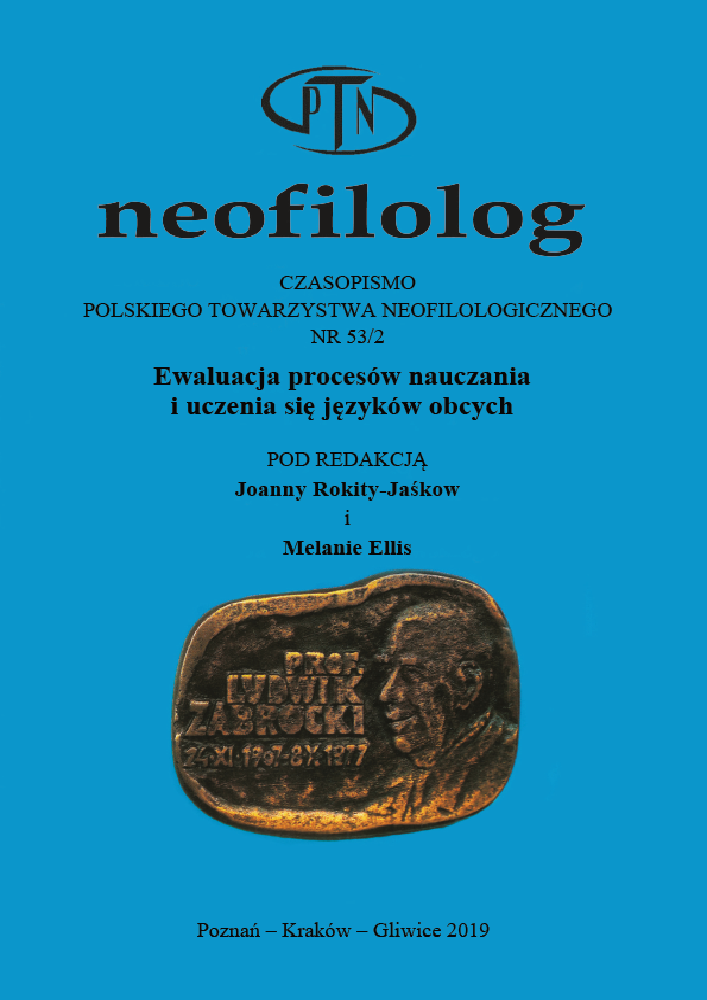Abstrakt
Communication in a foreign language requires activation of numerous, not necessarily linguistic, competences. As recent studies suggest, in order to facilitate this complicated process, people tend to put on different masks and change their personality-related behaviours. Such behavioural changes seem to be typical for testing situations when students’ actions are additionally influenced by stress. Drawing on her own observations and teaching experience, the author of this article strives to point to the correspondence between the manifestation of some behaviours resulting from students’ personality makeups and the effectiveness of their spoken performance in a foreign language. By directing readers’ attention to this correlation, she wants to underline the importance of personality training for the sake of effective communication in a foreign language. Additionally, this article presents the results of a survey conducted among 54 students of English at the Pedagogical University of Cracow – the data collected shows that students intentionally alter their personality-related behaviours in an attempt to earn higher scores on their oral exams. The direction of these changes might constitute useful advice for less experienced foreign-language test-takers.
Bibliografia
Anderson N. H. (1968), Likableness ratings of 555 personality-trait words (w) „Journal of Personality and Social Psychology”, nr 9 (3), str. 272-279.
Bernstein D. A., Penner L. A., Clarke-Stewart A., Roy E. (2008), Psychology. Boston, MA: Houghton Mifflin Company.
Berry V. (2007),Personality differences and oral test performance. Frankfurt: Peter Lang.
Biedroń A. (2011), Personality factors as predictors of foreign language aptitude (w) „Studies in Second Language Learning and Teaching”, nr 1 (4), str. 467-489.
Biedroń A. (2013), Stability and variability of gifted L2 learners‘ personality within a Dynamic Systems Theory paradigm (w) Piechurska-Kuciel E., Piasecka L.(red.), Variability and stability in foreign and second language learning contexts. Newcastle upon Tyne: Cambridge Scholars Publishing, str. 2-26.
Braden J. P. (1995), Intelligence and personality in school and educational psychology (w) Saklofske D.H., Zeidner M. (red.), International handbook of personality and intelligence. New York, London: Springer, str. 621-650.
Brown A. (2003), Interviewer variation and the co-construction of speaking proficiency (w) „Language Testing”, nr 20(1), str. 1-25.
Costa P. T., McCrae R. (1985), The NEO personality inventory: Manual form S and form R. Odessa, Florida: Psychological Assessment Resources.
Dewaele J. (2012), Personality: Personality traits as independent and dependent variables (w) Mercer S., Ryan S., Williams M. (red.), Psychology for language learning: insights from research, theory and practice. Basingstoke: Palgrave Macmillan, str. 42-57.
Dewaele J., Furnham A. (1999), Extraversion: The unloved variable in applied linguistic research (w) „Language Learning”, nr 49 (3), str. 509-544.
DiSalvo D. (2018), Can Personality Change or Does It Stay the Same for Life? A New Study Suggests It's a Little of Both (w) “Forbes” Online: https://www.forbes.com/sites/daviddisalvo/2018/08/20/can-personality-change-or-it-stay-the-same-for-life-a-new-study-says-its-a-little-of-both/#325cc31279ca [DW 05.08.2018].
Dőrnyei Z. (2005), The psychology of the language learner: Individual differences in second language acquisition. London: Lawrence Erlbaum Associates, Publishers.
Feist J., Feist G.J. (2006), Theories of personality. Boston: McGraw-Hill.
Field J. (2011), Cognitive validity (w) Taylor L. (red.), Examining speaking: research and practice in assessing second language speaking. Cambridge: University of Cambridge ESOL Examinations/Cambridge University Press, str. 65-111.
Fitzpatrick P. (2001), A parent’s guide to bilingualism. Norderstedt: Books on Demand GmbH.
Fontana D. (1991), Psychology for teachers. Leicester: British Psychology Society.
Furnham A., Chamorro-Premuzic T. (2004), Personality and intelligence as predictors of statistics examination grades (w) „Personality and Individual Differences”, nr 37, str. 943-955.
Hall C. S., Lindzey G., Campbell J. B. (2013), Teorie osobowości. Warszawa: Wydawnictwo Naukowe PWN.
Kramsch C. (1986), Interactive discourse in small and large groups (w) Rivers W. (red.), Interactive language teaching. Cambridge: Cambridge University Press, str. 17-29.
Lalonde R. N., Lee P. A., Gardner R. C. (1987), The common view of the good language learner: An investigation of teachers' beliefs (w) „The Canadian Modern Language Review”, nr 44, str. 16-34.
Larsen R. J., Buss D. M. (2005), Personality psychology: Domains of knowledge about human nature. New York: McGraw Hill.
Liang H. Y., Kelsen B. (2018), Influence of Personality and Motivation on Oral Presentation Performance (w) „Journal of Psycholinguist Research”, nr 47 (4), str. 755-776.
Little B. (2014),My, myself and I: The science of personality and the art of wellbeing. New York: Public Affairs.
O’Brian P. G., Kennedy W. Z., Ballard K. A. (2007), Psychiatric. Mental health. Nursing. An introduction to theory and practice. Burlington: Jones & Bartlett Publishing.
Ockey G. (2011), Self-consciousness and assertiveness as explanatory variables of L2 oral ability: A latent variable approach (w) „Language Learning”, nr 61(3), str. 968-989.
Rada Europy (2003), Europejski system opisu kształcenia językowego: uczenie się, nauczanie, ocenianie. Warszawa: Wydawnictwo CODN.
Trawiński M. (2005), An outline of second language acquisition theories. Kraków: Wydawnictwo Naukowe Akademii Pedagogicznej.
Studenska A. (2011), Personality and parenting styles as predictors of self-regulation in foreign language learning (w) Arabski J., Wojtaszek A. (red.), Individual learner differences in SLA. Bristol, Buffalo, Toronto: Multilingual Matters, str. 44-62.
Taylor L., Wigglesworth G. (2009), Are two heads better than one? Pair work in L2 assessment contexts (w) „Language Testing,” nr 26 (3), str. 325-339.
Verhoeven L., Vermeer A. (2002), Communicative competence and personality dimensions in first and second language learners (w) „Applied Psycholinguistics”, nr 23 (3), str. 361-374.
NETOGRAFIA
Little B. (2016). Who are you, really? The puzzle of personality [TED talk]. https://www.ted.com/talks/brian_little_who_are_you_really_the_puzzle_of_personality [DW 12.05.2018]
Licencja
Prawa autorskie (c) 2019 Katarzyna Nosidlak

Utwór dostępny jest na licencji Creative Commons Uznanie autorstwa – Bez utworów zależnych 4.0 Międzynarodowe.
Przedstawiany utwór (artykuł) upubliczniany jest na podstawie umowy z autorem i na licencji Creative Commons Attribution-NoDerivatives 4.0 International (CC BY-ND 4.0).
Użytkownicy mają obowiązek podania wraz z rozpowszechnionym utworem, informacji o autorstwie, tytule, źródle (odnośniki do oryginalnego utworu, DOI) oraz samej licencji;
- bez tworzenia utworów zależnych,
- utwór musi być zachowany w oryginalnej postaci.
Uniwersytet im. Adama Mickiewicza w Poznaniu zachowuje prawo do czasopisma jako całości (układ, forma graficzna, tytuł, projekt okładki, logo itp.).

